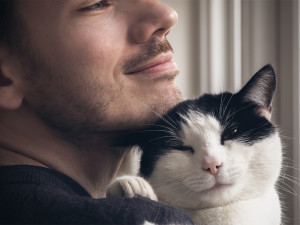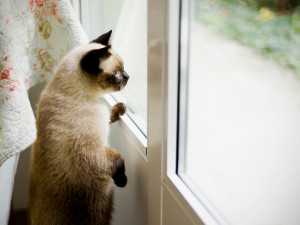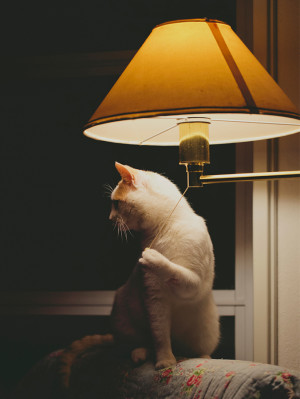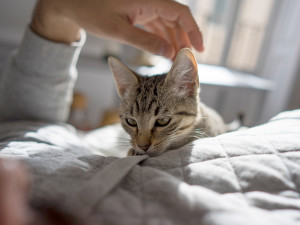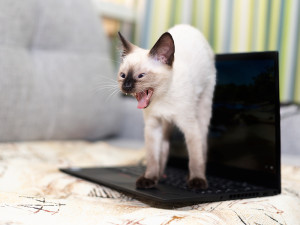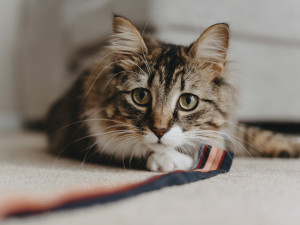10 Signs Your Cat Has Imprinted on You
Feeling like you have a little shadow these days? Here’s why that’s happening.
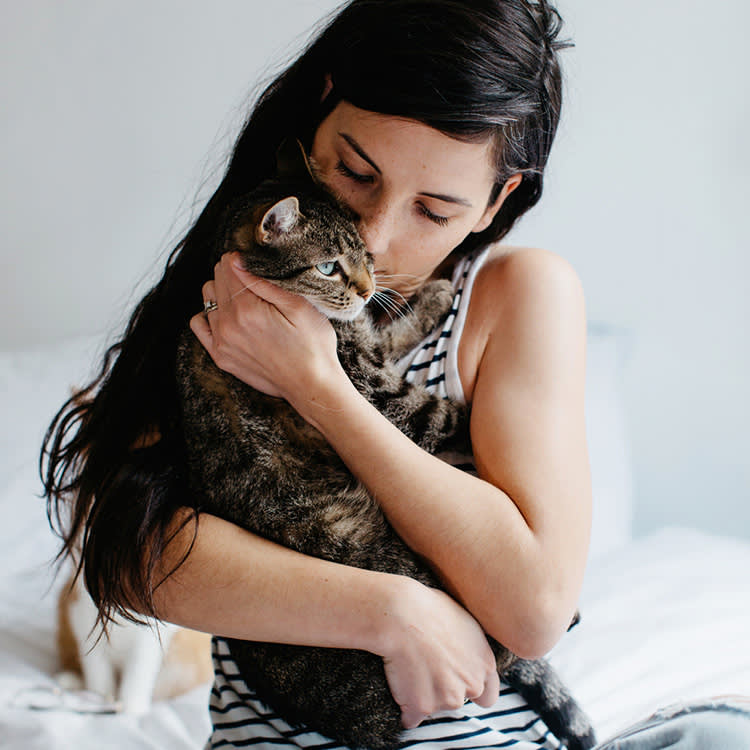
Share Article
In this Article:
Does My Cat Like Me? What Is Cat Imprinting? 10 Signs Your Cat Has Imprinted On You How To Make My Cat Love Me
We’ve all seen videos of dogs reuniting with humans they haven’t seen in weeks (or even years) and going into absolute paroxysms of pleasure. But what about cats? They tend to be less demonstrably affectionate than dogs, but a cat’s imprinting instinct is still strong, says Los Angeles-based certified feline training and behavior specialist and Kinship Collective member Cristin Tamburoopens in new tab (aka The Cat Counseloropens in new tab).
Recognizing whether your cat loves (or even likes) you is just a matter of knowing what to look for. Here are signs that your cat has imprinted on you, plus the reasons why they act so kooky sometimes (Hint: It’s often out of affection for you).
Main takeaways
Cats can imprint on (develop strong attachments to ) their human caretakers through establishing trust.
Loud purring, grooming, and slow blinking are all signs that your cat has imprinted on you.
Show your cat they’re safe with you by respecting their boundaries and allowing them to approach you on their own terms.
Does my cat like me?
Cats tend to be independent creatures who prefer to live life by their own rules. However, they’re still capable of forming strong connections with their human caretakers. If you’re wondering how to get a shy cat to like you, the best thing you can do is let the cat take the lead. Pay attention to their body language and use slow movements and a gentle voiceopens in new tab. Let the cat have the space they needopens in new tab and allow them to come to you when they’re ready.

What is cat imprinting?
Cat imprinting can mean several things, but typically it is defined by an establishment of trust. “Imprinting is something that happens during the sensitive, early development period of an animal’s life,” Tamburo says. “During this stage, an animal will (hopefully) build bonds or attachments — usually with their (cat) parents or the person who is taking care of them.”
Look for signs your cat has imprinted on you in their desire to be close to you, whether that means snuggling, sleeping in your bed, or just a general nearness. Your cat may also show affection by wanting to play with youopens in new tab.
10 signs your cat has imprinted on you
“Why does my cat like to sleep on me? Why does my cat like to lay on me? Why does my cat like to lick me? Why does my cat purr so loud next to me?” The answers to many of these questions come back to imprinting. Cats communicate not just with vocalizations, but with their body language and attention, letting you know that they consider you part of their family.
When a cat has imprinted on you, there are several unmistakable signs of their deep attachment. First, they display an intense and consistent desire for your company. They may follow you around the house, sit near you, or seek physical contact, such as snuggling or kneading. Imprinted cats often exhibit a unique vocalization — a specific sound reserved for their chosen person, signaling their need for attention or companionship.
Additionally, they may display signs of distress or anxiety when separated from you for extended periods. Imprinted cats tend to be highly responsive to your voice, gestures, and facial expressions, and they may even mimic your behavior in subtle ways. Ultimately, their trust and comfort around you become evident through relaxed body language, purringopens in new tab, and slow blinking, which signifies a deep sense of contentment and security in your presence.
To sum up, your cat has imprinted on you if they:
Communicate with you by meowing, purringopens in new tab, or making other happy noises like chirps. Loud purring is often a way of expressing a sense of happiness and relaxation.
Knead on you (aka “making biscuits”). Kneading is an expression of comfort and safety that goes back to your cat’s kitten days; it’s the cat equivalent of sucking their thumb.
Want to be near you. They may follow you around, cuddle you, sleep with you, and want to be on your lap whenever they get the chance.
Greet you when you come home. Your cat may have missed your presence and is eager to say hello.
Rub on you, marking you with their scent. Cats head butt (or bunt) their human parents to put their scent on youopens in new tab, marking you as part of their group.
Enjoy playing with you and even instigating play. Cats generally only display play behaviors when they’re happy and relaxed.
Bring you “gifts” and go on “hunting” excursions for you. While the gift of a dead mouse may not exactly be welcome, it’s a way your cat expresses affection. They may also bring you things like socks, candy wrappers, or feathers.
Groom you. Cats often groom members of their family, so take it as a compliment, even though their tongues can be a little rough.
Slow blink at you. It might feel creepy, but your cat slow blinksopens in new tab at you because they trust you. Slow blinking is a sign that they are comfortable and relaxed in your presence.
Display their trust by showing you their belly (although this may not be an invitation to touch said belly). If your cat shows you their belly, that means they feel comfortable around you.
At what age do kittens begin to imprint?
“The initial imprinting stage for kittens tends to occur between two and seven weeks after birth,” Tamburo says. “Though a very short window in a cat’s relatively long life, the stimuli that they are and are not exposed to during this time can really shape their behavior and personality for the rest of their lives.”
After eight weeks, once a kitten has imprinted on their mother and littermates, the next stage of socialization begins — connecting with humans. “Additional socialization also occurs through their first four months, which is why, in the rescue world, we generally try to get kittens socialized and trusting humansopens in new tab by this four-month mark,” Tamburo says.
So, a person shouldn’t try to take a kitten away from their mother too early, in the hopes of getting them to imprint with them more strongly? “Kittens need and deserve time with their mothers and siblings,” Tamburo says. “It’s important for their overall development.”
Can older cats imprint on you?
Yes, older cats can imprint on you, although it may take a bit longer and manifest in different ways. Socialization after four months is still possible but can be more challenging. “Cats, like humans, imprint throughout their lives,” Tamburo says. “[Once] properly socialized, cats will often become imprinted on a human, even if they were not together during that early, sensitive period.” Older catsopens in new tab may be more likely to get attached to one person. “Often, this will occur with whichever human in the home provides the cat with the most care and attention,” Tamburo says.
Are certain breeds more likely to imprint than others?
Siamese, Ragdoll, Sphynx, and Maine Coon cat breeds tend to be needier and are more likely to imprint on a person. Some cats can be too attached to you. Separation anxiety can be a real issue for cats (just like for dogs), especially for those adopted during the pandemic, who got used to having their humans around all the time and now have to adjust to them spending more time out of the house.
Do some cats show fake affection?
Cats don’t “fake affection” to get more food or be let outside, but they do use their body language to communicate their needs to you. Every cat is different, though, so how they express affection or demonstrate their bond with their person is different, too. But the desire to imprint — to connect and trust — is hardwired into cats (and humans). It’s a survival instinct.
“This is something we usually see in stray or feral cats, who may have missed their socialization period but still trust that one human who cares for them,” Tamburo says. “For instance, a colony of feral cats will likely run from most humans but will be excited to see the person who feeds them and cares for them. In some cases, they may show affection, but often they will accept the food and go back to their daily routine.”
Does my cat know I love them?
While cats might not understand the concept of love, they do pick up on the affection you show them, your body language, and the care you provide them. All that love helps your cat build a strong bond with you. Even the grumpiest cats can sense the love and affection a person shows them; they just don’t always return it in a way that’s super obviousopens in new tab.
How to make my cat love me
How do you get a cat to like you? Understanding how to read cat body language can help you determine your cat’s feelings for you — and help you figure out how best to show your love in return. While you can’t force your cat to imprint on you, you can strengthen your bond by providing them with time, attention, and affection. If you’re wondering how to get a cat to like you, consider these tips.
One of the best things you can do is mirror your cat’s body language while speaking softlyopens in new tab and respecting their spaceopens in new tab. Avoid direct eye contact, which cats can interpret as intimidating. Instead, let your cat approach you and request pets before reaching out yourself.
Cats like to keep to a schedule, so try establishing a daily routineopens in new tab. If you have dinner and go to bed around the same times every night, your cat will likely feel more comfortable because they can predict what’s going to happen next.
You can even use positive reinforcementopens in new tab to help your cat develop positive associations with petting. Feed them treats while petting them to let them know that something good happens when they open up to contact.
FAQs
How do you tell if a cat has imprinted on you?
You can tell your cat has imprinted on you when they communicate with happy meows and purrs, follow you around, sleep and cuddle with you, and show you their belly.
What does it mean when a cat has imprinted on you?
When a cat has imprinted on you, this means that they trust you and have a strong bond with you. They feel at ease with you because you make them feel safe, happy, and well cared for.
Do cats get attached to one human?
Cats form deep bonds with their humans and can get attached to one or more people depending on their history, personality, and socialization.
Does a cat trust you if they sleep next to you?
Yes, a cat trusts you if they sleep next to you. Sleeping, cuddling, and following you around are signs that a cat has formed a bond with you.
Should you hug your cat?
Generally speaking, cats do not like to be hugged or constrained. But each cat has their own personality and preferences, so some cats may enjoy being cuddled and hugged while others may prefer to be left alone.
How attached do cats get to their people?
Studies show that cats can actually become as attached to their pet parents as dogs — they just express their affection differently.
References
Baillie, Katherine. “Demystifying Feline Behavior.” Penn Today, 19. Feb. 220, penntoday.upenn.edu/news/demystifying-feline-behavioropens in new tab.
“Building a Trusting Relationship With Fearful Cats.” Metro Nashville Animal Care & Control, filetransfer.nashville.gov/portals/0/sitecontent/Health/PDFs/Animal/AdoptionResources/FearfulCats.pdfopens in new tab. Accessed 3 Dec. 2024.
“Cat Behavior Tips.” Regional Animal Services of King County, kingcounty.gov/~/media/depts/regional-animal-services/files/guides-for-pets/catbehaviortips_raskc.ashx?la=enopens in new tab. Accessed 3 Dec. 2024.
“Feline Adoption Packet.” DuPage County Animal Services, cms5.revize.com/revize/dupage/Animal%20Services/Documents/Adopting%20From%20DCAS/Cat%20Adoption%20Packet.pdfopens in new tab. Accessed 3 Dec. 2024.
Finka, Lauren R., et al. “Owner Personality and the Wellbeing of Their Cats Share Parallels With the Parent-Child relationship.” PLoS ONE, vol. 14, no. 2, Feb. 2019, p. E0211862. https://doi.org/10.1371/journal.pone.0211862opens in new tab.
Kucera, Tabitha. Types of Play for Cats: A Comprehensive Guide. 2020, www.montgomerycountymd.gov/animalservices/Resources/Files/Playingwithyourcat-2020.pdfopens in new tab.
Molier, Sarah-Jane. “Gentle Cat Love Bites: What Do They Mean? Feline Behavior Explained.” The Vets, 30 June 2024, thevets.com/blog/cat-love-bitesopens in new tab.
Nagasawa, Takumi, et al. “The Urinary Hormonal State of Cats Associated With Social Interaction With Humans.” Frontiers in Veterinary Science, vol. 8, July 2021, https://doi.org/10.3389.fvets.2021.680843opens in new tab.
“Positive Reinforcement; Training Your Cat.” Oklahoma City Animal Welfare, www.okc.gov/home/showpublisheddocument/2074/635908683835430000opens in new tab. Accessed 3 Dec. 2024.
“Reducing Your Cat’s Fearful Behavior.” Oklahoma City Animal Welfare, www.okc.gov/home/showpublisheddocument/2088/635908684713870000opens in new tab. Accessed 3 Dec. 2024.
Rochlitz, Irene. “The Welfare of Cats.” Animal welfare, 2007, https://doi.org/10.1007/978-1-4020-3227-1opens in new tab.
Shreve, Kristyn R. Vitale, et al. “Social Interaction, Food, Scent or Toys? A Formal Assessment of Domestic Pet and Shelter Cat (Felis Silvestris Catus) Preferences.” Behavioural Processes, vol. 141, 2017, pp. 322-328, www.sciencedirect.com/science/article/pii/S0376635716303424opens in new tab, https://doi.org/10.1016/j.beproc.2017.03.016opens in new tab.
Taub, Benjamin. “Your Cat Knows When You’re Talking to It, New Research Suggests.” IFLScience, 25 Oct. 2022, www.iflscience.com/your-cat-knows-you-re-talking-to-it-but-just-doesn-t-care-65908opens in new tab.
Turner, Dennis C. “The Mechanics of Social Interactions Between Cats and Their Owners.” Frontiers in Veterinary Science, vol. 8, Mar. 2021, https://doi.org/10.3389.fvets.2021.650143opens in new tab.
Turner, Dennis C. “A Review of Over Three Decades of Research on Cat-Human and Human-Cat Interactions and Relationships.” Behavioural Processes, vol. 141, Aug. 2017, pp. 297-304, https://doi.org/10.1016/j.beproc.2017.01.008opens in new tab.
“Understanding Your Talkative Cat.” Oklahoma City Animal Welfare, www.okc.gov/home/showpublisheddocument/2100/635908685530930000opens in new tab. Accessed 3 Dec. 2024.
“Why and How Do Cats Purr?” The Library of Congress, 2015, www.loc.gov/everyday-mysteries/browse-all-questions/item/why-and-how-do-cats-purr/opens in new tab. Accessed 3 Dec. 2024.
“Why Do Cats Rub Their Cheeks on Stuff?” Ask Dr. Universe, 9 Nov. 2023, askdruniverse.wsu.edu/2023/11/09/7411opens in new tab.

Charles Manning
Charles Manning is an actor and writer based in New York City. In his free time he likes to cook, go swimming at the public pool, volunteer at the LGBTQ senior center, and foster senior and special-needs cats. His work has previously appeared in Cosmopolitan, Elle, Marie Claire, Harper’s Bazaar, Seventeen, and Nylon.
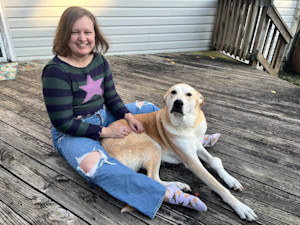
Savannah Admire
Savannah Admire is a writer and pet mom to two dogs and a cat. Under the name Savannah Cooper, she has published poetry in 40 different publications, as well as a poetry book, Mother Viper (2025). When she’s not writing, you can find her reading, taking photos, or volunteering as a content creator for her local community theatre. As a pets writer, she focuses on cat and dog behavior and pet parenthood. She currently lives in Western Maryland.
Related articles
![cat snuggling man]()
What’s Your Cat’s Love Language?
Five surprising ways cats show affection (and how you can show it back), according to a cat behaviorist.
![Siamese cat standing on two feet in order to look out of the window]()
How to Ease Your (Cat’s) Return-to-Office Anxiety
A veterinarian and a behaviorist’s tips for preparing your cat for your new WFO schedule.
![White cat switching on lamp on couch]()
Why Does Your Cat Wake You Up at Night?
You want to sleep, your cat wants to party. Here’s how to deal.
![kitten sleeping on top of person]()
Why Does Your Cat Sleep on You? 7 Reasons and What It Means
Not into cuddling? Too bad—they’re spending the night.
![An angry and hissing Siamese kitten standing on top of a laptop computer in the living room]()
You Don’t Have to Live Like This—You Can Get a Trainer For Your Cat
Tips to help you find a legit behaviorist (according to a veterinary behaviorist).
![A cute cat laying on the ground with wide eyes]()
Why Do Cats Slow Blink?
Here’s what your cat’s favorite move means.

